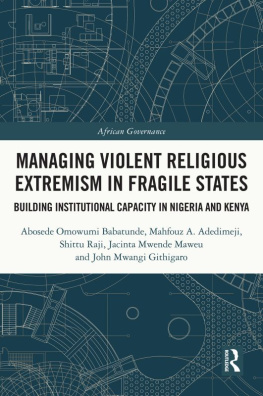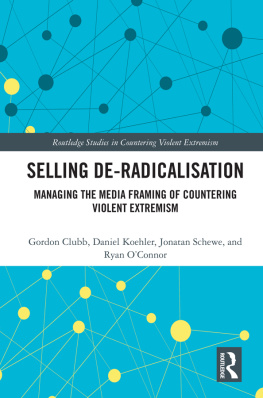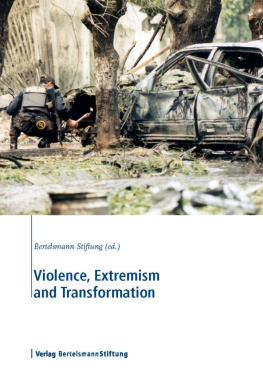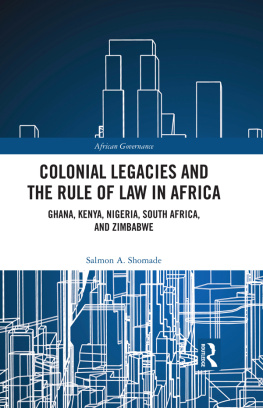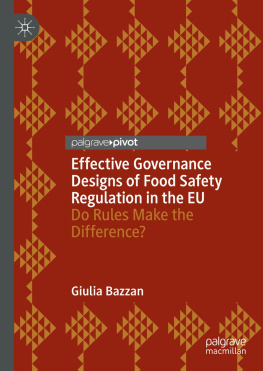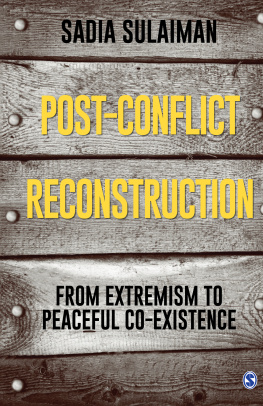Managing Violent Religious Extremism in Fragile States
This book examines how African states can build the institutional capacity to better prevent, manage and cope with the new security challenges posed by violent religious extremism.
Despite the evidence that violent religious extremism is exacerbated by underlying social, political, economic and governance factors, many states have focused their efforts only on reactive and coercive response strategies, overlooking more long-term measures. This comparative study of Nigeria and Kenya reflects on why insurgency in Kenya has not escalated to full blown terrorism as it has with Boko Haram in Nigeria, in spite of the similarities in relatively weak institutions of governance and colonial legacies across the two countries. The book interrogates the policy and institutional responses that have been put in place in both countries to address security challenges, and the extent of their efficacy in light of the intricate networks of politics, governance, corruption, poverty and violence and the relative fragility of state institutions. The authors highlight the areas of convergence and divergence in institutional capacities and recommend policies to enhance the capacity of institutions to manage violent religious extremism.
This book will be of interest to scholars of African Politics, Security, Peace Studies and Terrorism.
Abosede Omowumi Babatunde is a Senior Lecturer at the Centre for Peace and Strategic Studies, University of Ilorin, Nigeria. She earned a Master's and PhD degree in Peace and Conflict Studies at the University of Ibadan, Nigeria. She is a former member of the Governing Council of the International Peace Research Association (IPRA). She is also a Chartered Mediator and member of the Institute of Chartered Mediators and Conciliators of Nigeria.
Mahfouz A. Adedimeji is a Professor of Pragmatics and Applied English Linguistics at the University of Ilorin, where he had served as Director of the Centre for Peace and Strategic Studies. A former member of the Governing Council of the International Peace Research Association (IPRA), he currently serves as pioneer Vice Chancellor of Ahman Pategi University, Patigi, Kwara State, Nigeria.
Shittu Raji is a Senior Lecturer at the Centre for Peace and Strategic Studies (CPSS), University of Ilorin, Nigeria. Apart from being the Chairman, Society for Peace Studies and Practice (SPSP) Kwara State chapter, he is a Chartered Mediator and member of the Institute of Chartered Mediators and Conciliators of Nigeria.
Jacinta Mwende Maweu is a Senior Lecturer in Philosophy and Media studies at the University of Nairobi, Kenya where she researches and teaches in the areas of social and political philosophy, media and Conflict, Media and democracy, Media and human rights. She is a former member of the Governing Council of the International Peace and Research Association (IPRA) and currently a Co-convener of the Media, Conflicts and Peace Commission in IPRA.
John Mwangi Githigaro is Lecturer in Peace and Conflict Studies at St. Pauls University, Limuru, Kenya. He holds PhD in International Relations from the United States International University (USIU-A), Nairobi, Kenya. He holds an MA in International Relations and a BA in Communication.
African Governance
17. Post-Election Violence in Africa
The Impact of Judicial Independence
By Meshack Simati
18. The Everyday State in Africa
Governance Practices and State Ideas in Ethiopia
By Daniel Mulugeta
19. Democratic Practice and Governance in Nigeria
Edited by Ebenezer Oluwole Oni, Omololu Michael Fagbadebo, and Yagboyaju Dhikru Adewale
20. Political Change and Constitutionalism in Africa
Emerging Trends
Edited by Okon Akiba
21. Civil Society and Democracy in Nigeria
A Theoretical Approach
Bernard Nwosu
22. Complicity and Responsibility in Contemporary African Writing
The Postcolony Revisited
Minna Johanna Niemi
23. The Politics of Contemporary Ethiopia
Ethnic Federalism and Authoritarian Survival
Yohannes Gedamu
24. Managing Violent Religious Extremism in Fragile States
Building Institutional Capacity in Nigeria and Kenya
Abosede Omowumi Babatunde, Mahfouz A. Adedimeji, Shittu Raji, Jacinta Mwende Maweu and John Mwangi Githigaro
First published 2022
by Routledge
2 Park Square, Milton Park, Abingdon, Oxon OX14 4RN
and by Routledge
605 Third Avenue, New York, NY 10158
Routledge is an imprint of the Taylor & Francis Group, an informa business
2022 Abosede Omowumi Babatunde, Mahfouz A. Adedimeji, Shittu Raji, Jacinta Mwende Maweu and John Mwangi Githigaro
The right of Abosede Omowumi Babatunde, Mahfouz A. Adedimeji, Shittu Raji, Jacinta Mwende Maweu and John Mwangi Githigaro to be identified as authors of this work has been asserted by them in accordance with sections 77 and 78 of the Copyright, Designs and Patents Act 1988.
All rights reserved. No part of this book may be reprinted or reproduced or utilised in any form or by any electronic, mechanical, or other means, now known or hereafter invented, including photocopying and recording, or in any information storage or retrieval system, without permission in writing from the publishers.
Trademark notice: Product or corporate names may be trademarks or registered trademarks, and are used only for identification and explanation without intent to infringe.
British Library Cataloguing-in-Publication Data
A catalogue record for this book is available from the British Library
Library of Congress Cataloging-in-Publication Data
A catalog record has been requested for this book
ISBN: 978-0-367-34239-5 (hbk)
ISBN: 978-1-032-11112-4 (pbk)
ISBN: 978-1-003-00474-5 (ebk)
DOI: 10.4324/9781003004745
Typeset in Bembo
by KnowledgeWorks Global Ltd.
Contents
1Historicization of religious extremism in Africa
2Conceptual clarification
3Al-Shabaab and Boko Haram movements in East and West Africa
4The Boko Haram insurgency in Nigeria
5The threat of Al-Shabaab extremism in Kenya
6Institutional strategies to counter violent religious extremism in Nigeria and Kenya
7African States and violent extremism
8Religious ideology and terrorism in Africa
9Youth radicalism and violent religious extremism
10Conclusion
- 1 Historicization of religious extremism in Africa
- 2 Conceptual clarification
- 3 Al-Shabaab and Boko Haram movements in East and West Africa
- 4 The Boko Haram insurgency in Nigeria
- 5 The threat of Al-Shabaab extremism in Kenya
- 6 Institutional strategies to counter violent religious extremism in Nigeria and Kenya
- 7 African States and violent extremism
- 8 Religious ideology and terrorism in Africa
- 9 Youth radicalism and violent religious extremism
- 10 Conclusion
Figure
3.1Absolute deaths from Boko Haram violence in Nigeria (20092015)
Tables
3.1Number of deaths from Boko Haram attacks (20092015)
6.1 Summary of terrorism incidences in Kenya (19802019)
Author biographies
Abosede Omowumi Babatunde

